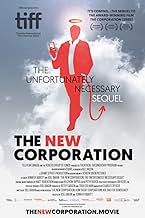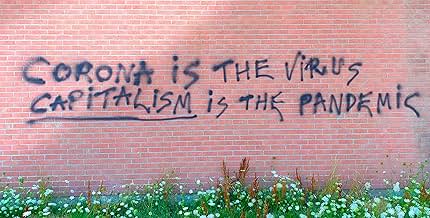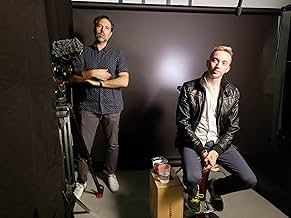The New Corporation: The Unfortunately Necessary Sequel
- 2020
- 1 घं 45 मि
IMDb रेटिंग
7.0/10
731
आपकी रेटिंग
अपनी भाषा में प्लॉट जोड़ेंExposes how companies are desperately rebranding as socially responsible - and how that threatens democratic freedoms.Exposes how companies are desperately rebranding as socially responsible - and how that threatens democratic freedoms.Exposes how companies are desperately rebranding as socially responsible - and how that threatens democratic freedoms.
- पुरस्कार
- 1 जीत और कुल 8 नामांकन
फ़ीचर्ड समीक्षाएं
Even though I'm totally on the capitalism-hating boundwagon, it's still hard to rate this film as a documentary regarding an unbiased, neutral look at a relative subject. Being essentially an open love letter to Bernie Sanders, Alexandria Ocasio-Cortez and all socialist activists in the west world, and likewise zealously bashing and pounding on Amazon, Facebook, Google, etc, this film shouldn't be sorted as a documentary.
How this film works, however, is regarded as an essay film which theorises certain attributes towards the "giant" corporations and their devastating and deadly effects on the present world, just "for a few dollars more". In this standpoint, the film is a wholesome and comprehensive work for it points out several pitfalls and valid issues within those corporations, builds up a hypothesis to generalize their conducts, and in the final third part arrives at a fully fleshed-out solution.
If you are looking for a documentary presenting or representing facts and realities, then this film is likely to disappoint. But if you are looking for a totally biased explanation and analysis of our modern universe, then this is definitely something to consider.
How this film works, however, is regarded as an essay film which theorises certain attributes towards the "giant" corporations and their devastating and deadly effects on the present world, just "for a few dollars more". In this standpoint, the film is a wholesome and comprehensive work for it points out several pitfalls and valid issues within those corporations, builds up a hypothesis to generalize their conducts, and in the final third part arrives at a fully fleshed-out solution.
If you are looking for a documentary presenting or representing facts and realities, then this film is likely to disappoint. But if you are looking for a totally biased explanation and analysis of our modern universe, then this is definitely something to consider.
I really liked the original The Corporation, so I was excited about this follow up. However, as many have mentioned this sequel is less of a documentary and more of a socialist propaganda; even if you agree with everything that is said and presented here (and as a left leaning person myself, I totally do), it offers very little in terms of an actual unbiased look at corporations like the first film did. In the end worth the watch if you are on the left side of the political spectrum, but know that it might end up just being another piece of your echo chamber.
If you want to now how we got here and the terrible road we're headed down, watch this. If you're blinded by ideology and don't come away with something, then you're a lost cause. If not, this should galvanize you at least somewhat.
This is a well-produced documentary that starts off quite informatively by calling out how corporations use various methods to reinforce the narrative that they are socially responsible and helping the planet while simultaneously putting profits before anything. Great point made about how banks (JP Morgan is called out specifically) responsible for the 2008 crisis fancied themselves as "saviours" in the fallout by investing in a place like Detroit, where they stand to make a bundle either way. It also makes good points about corporate tax evasion and influence of their money in politics.
It really only tells one side of the story in most cases it studies however, which is a strongly socialist perspective. I'm not saying that's wrong as I myself support certain socialist ideas, but it's worth noting the politics of those being interviewed is overwhelmingly left-wing. As a result, it's more of a one-sided conversation, which is quite disappointing and a bit preachy to the viewer. As with any contemporary media these days, it also had to throw in a jab at Trump supporters because apparently they all support corporate greed and blame their struggles on minorities.
My biggest qualm is that in the last half or so it jumps from topic to topic, mostly socialist talking points, that are essentially unrelated to corporations aside from the Australian coal company. It's like I was watching a completely different documentary and it felt more like disorganized propaganda at that point.
First half, 7.5/10. Second half, 3/10. I really wish they would have gone into more depth on a couple of topics as opposed to just briefly giving left-leaning viewpoints on a cherry-picked assortment of social, economic, and political topics. It was reasonably interesting overall though, so it gets a 6.
It really only tells one side of the story in most cases it studies however, which is a strongly socialist perspective. I'm not saying that's wrong as I myself support certain socialist ideas, but it's worth noting the politics of those being interviewed is overwhelmingly left-wing. As a result, it's more of a one-sided conversation, which is quite disappointing and a bit preachy to the viewer. As with any contemporary media these days, it also had to throw in a jab at Trump supporters because apparently they all support corporate greed and blame their struggles on minorities.
My biggest qualm is that in the last half or so it jumps from topic to topic, mostly socialist talking points, that are essentially unrelated to corporations aside from the Australian coal company. It's like I was watching a completely different documentary and it felt more like disorganized propaganda at that point.
First half, 7.5/10. Second half, 3/10. I really wish they would have gone into more depth on a couple of topics as opposed to just briefly giving left-leaning viewpoints on a cherry-picked assortment of social, economic, and political topics. It was reasonably interesting overall though, so it gets a 6.
90% of the negative reviewers either didn't watch the movie or came into it with a decidedly anti-socialism (a word that they couldn't define in real world terms) bent and pro-capitalism mindset.
For one thing, the movie is OK. Points out how big banks and corporations have taken to hiding behind the "social justice" messages they've cribbed from whatever actual movement is convenient for them at a given time. They don't pick the best interview subjects (we've all heard Bernie "Sheepdog" Sanders and AOC's (correct) spiels before). They could have sought out people like Howie Hawkins or other less-well-known advocates for *actual* socialism and for reining in the power that these organizations exercise over our government through dark money, lobbying, insider-trading and outright bribery.
Nobody including negative reviewers cares to point out how "crony capitalism" and "corporate capitalism" are any different from each other because they haven't done the homework or read authors like Michael Hudson or seen movies like "The Wobblies" about the IWW. If they had, they'd know what the "Overton Window" is and that it was in fact "radical left-wing socialists" who are responsible for the end of child labor and the 8 hour work day among many other things including the New Deal which - unlike the bailouts of too-big-to-jail banks in 2008 - bailed out the American working class and set up bulwarks against monopolistic, unethical corporate practices. The Republicans starting with Reagan and continuing through Democrats like Clinton systematically tore down as much of that as they could on behalf of their financial/corporate masters (buy bye Glass-Steagall!!! Hello NAFTA!!!) and in the same time period the Overton Window has intentionally been shifted to the right with even Starbucks baristas forming unions portrayed as "radical leftists" trying to bring down capitalism (also, why do people insist on capitalizing that word as though it's a proper noun? I'll tell you - the consistent, constant propaganda paid for by the big banks/corps and unwittingly consumed and absorbed by the would-be working class).
Take away the Overton Window and there's absolutely zero "left-wing" or "radical left" to this film. Anyone who called Obama a leftist should not be trusted to objectively review it. All in all, the Necessary Sequel is a bit of a let-down from the previous movie, but worth watching if you can do so with an open mind (something far too many of my closed-minded "conservative" friends think they have, but really don't, thanks to YouTube influencers and the like).
For one thing, the movie is OK. Points out how big banks and corporations have taken to hiding behind the "social justice" messages they've cribbed from whatever actual movement is convenient for them at a given time. They don't pick the best interview subjects (we've all heard Bernie "Sheepdog" Sanders and AOC's (correct) spiels before). They could have sought out people like Howie Hawkins or other less-well-known advocates for *actual* socialism and for reining in the power that these organizations exercise over our government through dark money, lobbying, insider-trading and outright bribery.
Nobody including negative reviewers cares to point out how "crony capitalism" and "corporate capitalism" are any different from each other because they haven't done the homework or read authors like Michael Hudson or seen movies like "The Wobblies" about the IWW. If they had, they'd know what the "Overton Window" is and that it was in fact "radical left-wing socialists" who are responsible for the end of child labor and the 8 hour work day among many other things including the New Deal which - unlike the bailouts of too-big-to-jail banks in 2008 - bailed out the American working class and set up bulwarks against monopolistic, unethical corporate practices. The Republicans starting with Reagan and continuing through Democrats like Clinton systematically tore down as much of that as they could on behalf of their financial/corporate masters (buy bye Glass-Steagall!!! Hello NAFTA!!!) and in the same time period the Overton Window has intentionally been shifted to the right with even Starbucks baristas forming unions portrayed as "radical leftists" trying to bring down capitalism (also, why do people insist on capitalizing that word as though it's a proper noun? I'll tell you - the consistent, constant propaganda paid for by the big banks/corps and unwittingly consumed and absorbed by the would-be working class).
Take away the Overton Window and there's absolutely zero "left-wing" or "radical left" to this film. Anyone who called Obama a leftist should not be trusted to objectively review it. All in all, the Necessary Sequel is a bit of a let-down from the previous movie, but worth watching if you can do so with an open mind (something far too many of my closed-minded "conservative" friends think they have, but really don't, thanks to YouTube influencers and the like).
क्या आपको पता है
- ट्रिवियाThis program documentary was funded by the biggest media corporation in Canada
- कनेक्शनFollows The Corporation (2003)
टॉप पसंद
रेटिंग देने के लिए साइन-इन करें और वैयक्तिकृत सुझावों के लिए वॉचलिस्ट करें
- How long is The New Corporation: The Unfortunately Necessary Sequel?Alexa द्वारा संचालित
विवरण
- रिलीज़ की तारीख़
- कंट्री ऑफ़ ओरिजिन
- आधिकारिक साइटें
- भाषा
- इस रूप में भी जाना जाता है
- Новая корпорация: К несчастью необходимый сиквел
- फ़िल्माने की जगहें
- उत्पादन कंपनियां
- IMDbPro पर और कंपनी क्रेडिट देखें
- चलने की अवधि1 घंटा 45 मिनट
- पक्ष अनुपात
- 16:9 HD
इस पेज में योगदान दें
किसी बदलाव का सुझाव दें या अनुपलब्ध कॉन्टेंट जोड़ें

टॉप गैप
By what name was The New Corporation: The Unfortunately Necessary Sequel (2020) officially released in India in English?
जवाब


















